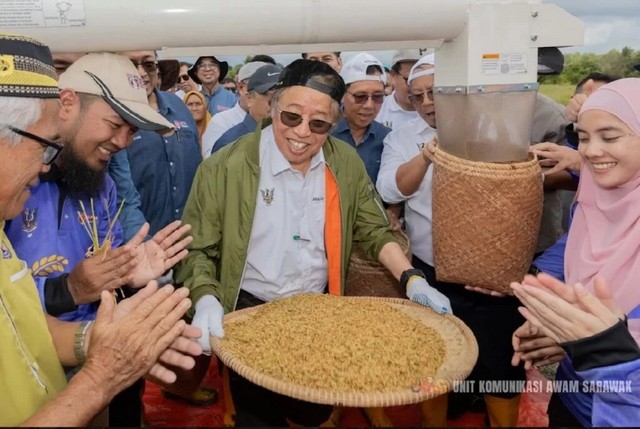In a bold endeavour to uplift the agricultural sector and bolster farmers’ incomes, Sarawak’s Premier, Datuk Patinggi Tan Sri (Dr) Abang Haji Abdul Rahman Zohari bin Tun Datuk Abang Haji Openg, has championed a series of pioneering rice cultivation projects across the state. Propelled by cutting-edge technology and strategic collaborations, these initiatives aim to enhance rice production and pave the way for Sarawak’s self-sufficiency in rice by 2030.
Revolutionising Rice Cultivation and Empowering Farmers Through Technology
Addressing a press conference, Premier Datuk Patinggi Tan Sri (Dr) Abang Haji Abdul Rahman Zohari emphasised the transformative potential of hybrid rice varieties coupled with modern technology and paid planting techniques.
He highlighted a collaborative study by Universiti Putra Malaysia (UPM) in the district of Lubok Punggor, Gedong, showcasing promising results.
Premier outlined, “The study conducted in Lubok Punggor, Gedong, by UPM in collaboration with local farmers has shown positive results by producing rice crops that can be harvested up to five times in 24 months. Therefore, if the technology used in the rice production here is continued, it will provide an additional income of 60% to the farmers.
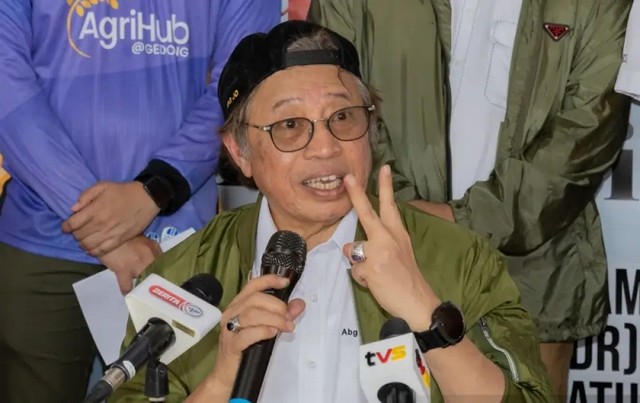
“The Sarawak government is keen on embracing new technologies and hybrid seeds. I tried one seed from Vietnam, which has shown the potential for higher yield.”
The Premier also underscored the socioeconomic impact of these advancements, indicating, “If there are two hectares of cultivation, it will be over RM12,000, and reaching such a figure would place farmers in the middle or high-income group.”
Premier’s vision extends beyond mere economic upliftment; he envisions a future where Sarawak achieves self-sufficiency in rice production, significantly contributing to the state’s food security and economic prosperity. As such, the rice cultivation project will be carried out in stages using the federal government’s allocation of RM173 million.
However, this amount may prove insufficient due to high irrigation system costs. Understanding the critical role of infrastructure in achieving the cultivation targets, the Sarawak Premier announced significant investments in upgrading irrigation and drainage systems in key paddy cultivation areas.
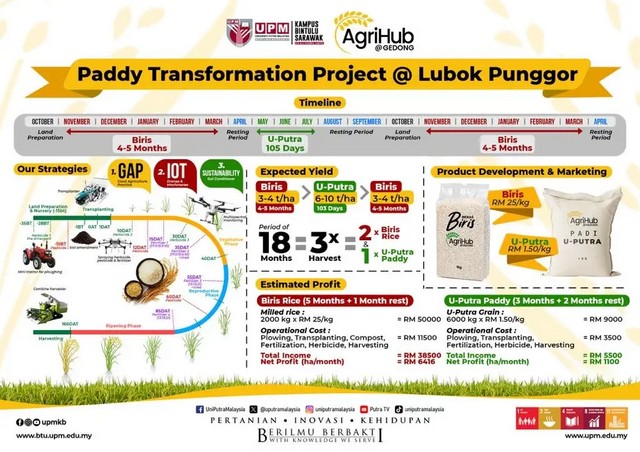
“The Sarawak government has allocated RM30 million to upgrade the irrigation and drainage systems in the paddy cultivation areas.”
The state-wide project is strategically designed to cover Sarawak’s southern and northern regions, encompassing Simunjan, Gedong, Sri Aman, Limbang, Lawas, and Bekenu. Premier emphasised the importance of equitable development across these regions, stating, “Each designated area will cover approximately 10,000 hectares, allowing us to optimise rice production and enhance food security for our people.”
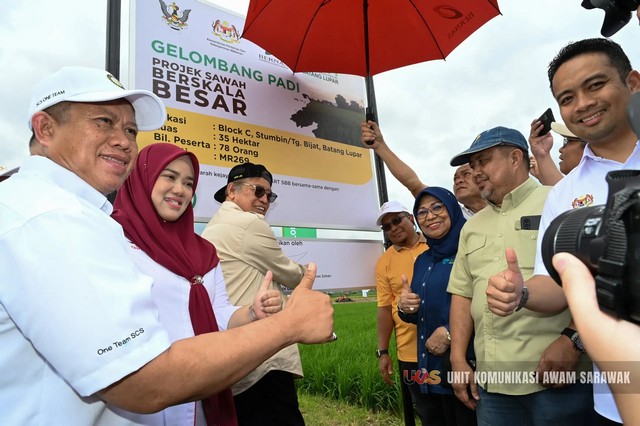
Central to the project’s success is adopting cutting-edge technologies and best practices, drawing inspiration from successful models such as the one pioneered by farmers in Kampung Lubok Punggor.
Embracing Technological Advancements
Datuk Patinggi Tan Sri (Dr) Abang Haji Abdul Rahman Zohari emphasised the pivotal role of technology in agricultural transformation, advocating for integrating Artificial Intelligence (AI) and the Internet of Things (IoT) in rice farming. He remarked, “Technologies, especially AI, play a significant role in intelligent agriculture.” Citing examples of modern farming practices, he stated, “Using smart devices, padi farmers would not need to work in the fields under the hot scorching sun to harvest their crops.
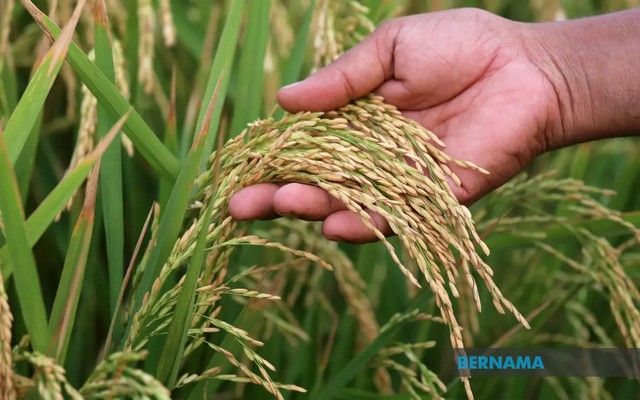
“For example, palm oil farmers in Bintulu now can harvest the fruits by using remote control. I believe the tractors and machines that we see today will be modified and innovated into a more convenient size to make them lighter and easier to be used and applied with AI. It can be done through technology. So I’m asking UPM to go towards that direction.”
Commenting further, Datuk Patinggi Tan Sri (Dr) Abang Haji Abdul Rahman Zohari said that using advanced technology, such as a smart paid monitoring system that could analyse the rice yield, would enable padi farmers to monitor environmental data and agricultural images while improving operations’ quality and reducing costs.
“They can fabricate the machine. After all, it’s just modification by using AI and then they can control via remote control. So it will be convenient for padi farmers to access their padi.”
The Premier’s emphasis on research and innovation underscores Sarawak’s commitment to sustainable agricultural practices and economic prosperity.
Path to Prosperity and Export Potential
Premier envisioned Sarawak’s emergence as a net rice exporter, stating, “My intention is that by 2027 or 2030, we will be exporting rice from Malaysia.”
He highlighted the potential of Sarawak’s rice cultivation projects to contribute significantly to Malaysia’s rice supply chain, stating, “If one hectare can produce yields of up to eight tonnes, then 10,000 hectares can produce up to 80,000 tonnes per planting season.” His unwavering commitment to agricultural prosperity heralds a promising future for the state and local farming communities.
Simultaneously, he expressed his hopes that private landowners would adopt modern paddy planting techniques to ensure food security in Malaysia. As of current, the Sarawak government plans to allocate about 20,000 hectares of land for high-yield rice cultivation and raise the current rice production rate of 36% to a self-sustaining 100%.
Under the visionary leadership of Premier Datuk Patinggi Tan Sri (Dr) Abang Haji Abdul Rahman Zohari, Sarawak embarks on a transformative journey towards agricultural excellence. Through innovative rice cultivation projects bolstered by technological advancements and strategic investments, the state paves the way for sustainable development and prosperity. As Sarawak progresses towards self-sufficiency, the Premier’s unwavering commitment to agricultural prosperity resonates through his visionary plans and strategic initiatives.


